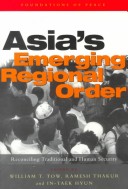The concept of 'human security' has captured the attention of both national policy-makers and independent analysts throughout Asia. Its most compelling feature is an emphasis on the social, economic and political well being of individuals, linking international security to the community and to the individual rather than restricting it to the purview of the state. The concept is especially relevant to an Asia-Pacific region which is experiencing immense structural changes. Immense human security problems threaten to overwhelm Asian states' capacities to resolve them: falling real incomes and rising poverty levels; destabilizing migration flows; food shortages and malnutrition; declining public health and education and intensifying crime rates. These problems cannot be solved by deploying military forces or relying on international diplomats to fashion traditional power balances along state-centric lines. They must instead be resolved through cooperative interaction among intellectual communities, government leaders, grass roots organizations and the general public. Most fundamentally, governments must initiate and sustain more direct ties with those over whom they presume to serve. This volume offers several proposals for integrating traditional and human security approaches, including supplementing the ASEAN Regional Forum with a more 'Asia-centric' security dialogue structure, developing groups of experts or 'epistemic communities' that could more readily influence policy-making elites in the region, and linking grass-root environmental groups, anti-nuclear groups and others to first and second track fora invested with identifying new regional security approaches.
- ISBN13 9789280810462
- Publish Date 1 July 2000
- Publish Status Active
- Publish Country US
- Imprint Brookings Institution
- Format Paperback
- Pages 360
- Language English
